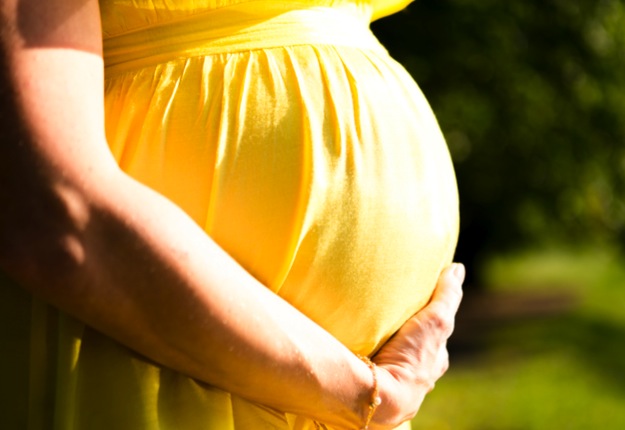Weight gain during pregnancy: how much is too much? Excessive weight gain during pregnancy increases the risks for mums and bubs.
Clare Collins, University of Newcastle; Jenna Hollis, University of Newcastle, and Siân Robinson, University of Southampton
During a healthy pregnancy, women gain weight as the baby grows. This is normal and necessary.
But recent research indicates that excessive weight gain during pregnancy increases health risks for mothers and their children.
So how do you get the right balance?
Weight gain guidelines
Recommended weight gain in pregnancy is based on body weight and body mass index (BMI) prior to becoming pregnant. If your pre-pregnancy BMI is:
- less than 18.5, aim to gain between 12.5 and 18 kg
- 18.5 to 24.9, aim to gain 11.5 to 16 kg
- 25.0 to 29.9, aim to gain 7 to 11.5 kg
- 30 or more, aim to gain just 5 to 9 kg.
Most weight gain occurs from week 13. For some women, body weight will not change too much during the first trimester of pregnancy, particularly for women who have had morning (noon and night) sickness.
Further reading – Health Check: what can you eat to help ease morning sickness in pregnancy?
Weight gain recommendations are higher for those having twins, with the target range depending on the woman’s pre-pregnancy BMI: 18.5-24.9 (weight gain: 17-25 kg), 25-29.9 (weight gain: 14-23 kg) and 30 or more (weight gain: 11-19 kg).
A recent review covering more than one million pregnancies found half the women gained too much weight. Even women who started pregnancy at a healthy weight (those with a BMI of 18.5 to 24.9) typically gained too much weight.
Our study of women in the United Kingdom found excessive weight gain was more common among women who were having their first baby.
Why is it important?
Gaining too much weight in pregnancy can affect the mother’s health. Excess weight gain has been linked to a higher risk of developing diabetes in pregnancy, high blood pressure, and complications during birth.
It can also affect the health of the baby in both the short-term and in the future. In a review of one million pregnancies, mothers who gained too much weight in pregnancy were more likely to have babies with a high birth weight compared to other mothers. Children of the mothers who gained too much weight were then at a higher risk of becoming obese as a child or adult.
Read more – Health Check: eating for two during pregnancy
Excess pregnancy weight gain can also make it more challenging to lose weight after the baby is born. Our recent study showed that women who gained more weight than recommended retained, on average, an extra 4kg six months after their baby was born. Of concern is that this extra weight can still be retained decades after pregnancy. Not shifting those extra few kilos after pregnancy increases the chances of developing obesity in the future.
Not gaining enough weight in pregnancy can also be a problem. Weight gain below the recommendations is associated with having a baby that is small for gestational age, or a preterm birth.
It’s important for women not to try and lose weight during pregnancy. Dieting or limiting food intake could mean the baby doesn’t get enough nutrients needed for their development.

Carlo Navarro
Five tips for healthy pregnancy weight gain
1. Start a conversation with a doctor or midwife. While talking about weight during antenatal visits can make some pregnant women feel anxious, knowing how much weight is appropriate can help improve the pregnancy outcomes for women and their infants. Having this conversation is important because a doctor or midwife can provide support. They can also refer pregnant women to a dietitian or other service, if needed.
2. Track weight gain from early in pregnancy. Monitoring weight in pregnancy can help keep weight gain “on track”. Try a pregnancy weight tracker; such as this one for women with a pre-pregnancy BMI of less than 25, or this one for women with a pre-pregnancy BMI of more than 25. Start recording weight as early in pregnancy as possible.
Remember every pregnancy is different, and the amount of weight gained each week won’t be identical. But it’s a great way to “keep check” and see whether weight gain patterns are tracking above or below the recommendations.
3. Focus on healthy eating. It’s a myth that you need to “eat for two” during pregnancy. During the first trimester, dietary energy needs (measured in calories or kilojoules) are only slightly higher so the amount of food eaten should remain about the same. But nutrient requirements increase, particularly for folate, iodine and iron, so women need to be mindful of the nutritional quality of food eaten.
While more food energy is needed during the second and third trimester, the amount of extra food is less than most people think. It would be the equivalent of a sandwich (such as egg, beef, hummus or cheese), or a yoghurt and banana. Use the Eat-for-Health Calculator to calculate the recommended daily serves from the five food groups to give you an idea of what you should be eating during pregnancy.
Read more – Health Check: what to eat and avoid during pregnancy
4. Exercise regularly. Being active is important during pregnancy. The national recommendations advise the accumulation of 150 minutes of exercise each week. Many exercises are safe during pregnancy, such as walking, swimming, stationary cycling and pregnancy-specific exercise classes. Doctors, midwives, exercise physiologists and physiotherapists can provide advice about the best options.
![]() 5. Enlist the support of a partner and family. Having a healthy lifestyle that includes eating healthily and being active is not just important for the mother and baby in pregnancy, but can also benefit other family members.
5. Enlist the support of a partner and family. Having a healthy lifestyle that includes eating healthily and being active is not just important for the mother and baby in pregnancy, but can also benefit other family members.
Clare Collins, Professor in Nutrition and Dietetics, University of Newcastle; Jenna Hollis, Conjoint Lecturer, University of Newcastle, and Siân Robinson, Professor of Nutritional Epidemiology, University of Southampton
This article was originally published on The Conversation. Read the original article.
Share your comments below




















-

-
-
june11 said
- 13 Feb 2018
-

-
-
Myrlie said
- 26 Jan 2018
-

-
-
Ellen said
- 19 Jan 2018

-

-
-
mom81879 said
- 19 Jan 2018
-

-
-
mom63542 said
- 18 Jan 2018
-

-
-
mom206279 said
- 18 Jan 2018
-

-
-
mom90758 said
- 18 Jan 2018
Post a comment5:25 pm
5:24 pm
8:07 am
7:52 am
9:00 pm
12:26 pm
11:59 am
To post a review/comment please join us or login so we can allocate your points.